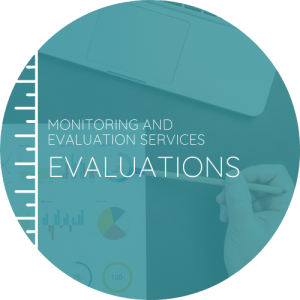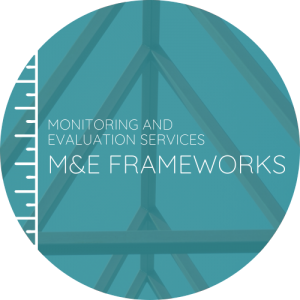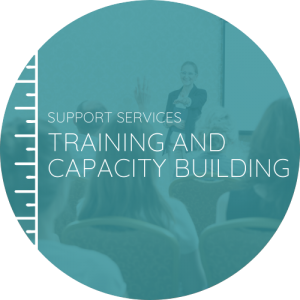EVALUATIONS
When we work with organisations, we are not only focused on measuring programmatic outcomes. We consider the organisation’s context; its staff skills and capacity; the complexity of its interventions; and the broader context in which it operates. We aim to add value beyond the deliverables we submit.
The following aspects therefore inform our approach to the monitoring and evaluation activities we undertake:
- We aim to demystify the evaluation process because we know that the field of monitoring and evaluation can be intimidating and daunting to many. We strive to make M&E jargon and processes accessible and understandable throughout our engagements with evaluation role-players.
- We follow a theory-based approach, where the underlying logic of your programme is used to inform the evaluation process. This means that we use a Theory of Change and a Logic Model as tools.
- We usually employ a mixed-methods approach to the data we collect because we value the contribution of both quantitative and qualitative research methods to the evaluation process.
- We are serious about generating evaluations that are utility-focused. This means that we always keep the users of the evaluation in mind and strive to deliver reports and outputs that meet their needs.
- We embed participatory principles into our methodology, to ensure that the evaluation results are as balanced as possible.
A comprehensive evaluation would span the full lifecycle of your project, supporting planning, implementation and next steps. Typically, the kinds of evaluations we undertake are as follows:
- A baseline assessment measures the conditions before you launch the project. This can used to guide the development of objectives, indicators and M&E systems.
- Mid-term review(s) identifies and addresses any issues in the design or implementation. Here we also identify and document early successes and collaboratively chart necessary actions to assist organisations to realise their project goals.
- End-term evaluations and post-project close-out evaluations assess if the project goals have been achieved, document lessons learned and necessary actions to replicate and/or scale the intervention.
Not quite what you need? We’d be happy to chat about how we can tailor our services to support you.
M&E FRAMEWORKS AND ORGANISATIONAL PROGRAMME STRATEGIES
Developing an M&E Framework to achieve your project goals
We develop comprehensive monitoring & evaluation (M&E) frameworks that align the project/organisational activities, outputs and outcomes, and measurement instruments to the reporting requirements. To do this, we conduct a situational analysis and then work with you to develop a Theory of Change and a Logic Model. These are expanded upon to build the M&E framework where data collection tools are drafted and the data collection and management plan is finalised. In order to embed the framework into the organisation, we present training sessions with staff that focus on equipping them to manage and utilise the framework optimally.
Developing an Organisational Programme Strategy to align M&E to your organisational and funding requirements
We assist organisations formalise their systems, review their operations and set up an overarching measurement framework for the collection of robust data that serves as evidence of the organisation’s activities. [This service builds on the development of an M&E framework]
The organisational M&E framework aligns with and is informed by the organisation’s strategic imperatives, which allows the organisation to report confidently on outcomes rendered by its programmes. This can be used by the organisation to source additional funding.
This service is best-suited to take place as part of the organisation’s programmatic strategic planning processes. We facilitate these too!
Not quite what you need? We’d be happy to chat about how we can tailor our services to support you.
TRAINING AND CAPACITY BUILDING
We offer training on a range of M&E-related topics, including: programme design principles; developing theories of change; developing M&E frameworks; data collection methods; data management; data analysis and reporting.
We provide generic training opportunities to organisations at our offices throughout the year.
Please contact us if you are interested in in-house training opportunities for your organisation. We also offer M&E coaching services to individuals in strategic management positions.




SOCIAL SCIENCE RESEARCH
We regularly conduct research to support our clients’ specific needs. These include:
Not quite what you need? We’d be happy to chat about how we can tailor our services to support you.